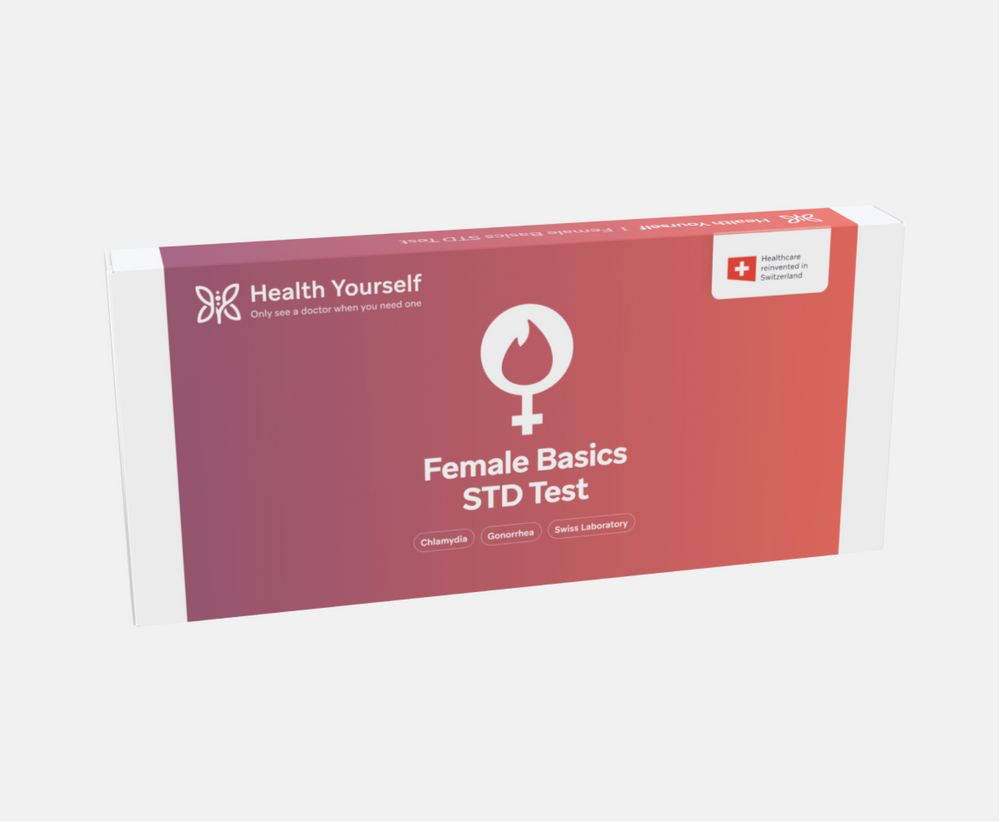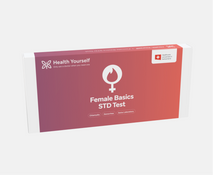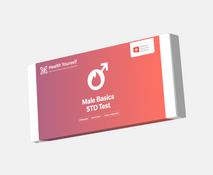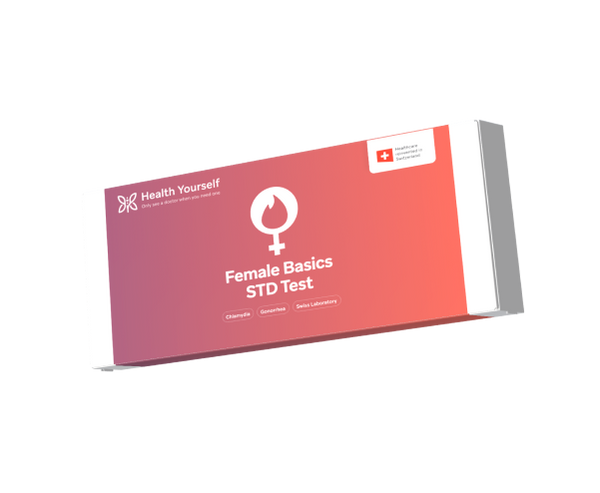
Female Basics STD Test
CHF 109
- Tests for Chlamydia and Tripper in women
- Take your sample from home, analysis by Swiss lab
- Results online in 2-3 days
Testing is simple, convenient and discreet
What it tests for
Get tested for the most common STDs
Chlamydia
1. Chlamydia is very common, but many people don't realise they have it because it does not cause any symptoms in up to 80% of cases. You can get it more than once.
2. Chlamydia infection may have long term health consequences like infertility.
3. Chlamydia's long-term health consequences can easily be prevented by regular screening and early treatment for sexually active people with changing sex partners.
50% of men and even 70% of women who have Chlamydia don't show symptoms. Many people unknowingly infect their partners. The most common symptom you experience? A text message from an ex, who claim they got it from you or gave it to you. If you have symptoms, these usually show 1-3 weeks after you have been in contact with Chlamydia. Typical symptoms include:
Women: Pain while urinating, unusual vaginal discharge, pain in the tummy or pelvis, pain during sex, bleeding after sex, bleeding between periods
Men: Pain while urinating, white, cloudy or watery discharge from the tip of the penis, burning or itching in the urethra (the tube that carries urine out of the body), pain in the testicles
Women
Untreated Chlamydia and Gonorrhoea are the most common causes of Pelvic Inflammatory Disease (PID). PID is an infection of the female reproductive organs. It may ultimately lead to chronic pain or infertility. As the symptoms of PID can be mild, you may not be aware of having it until the damage is done.
Unborn child
If you have a PID and it is not timely treated, it may cause the fertilized egg to nest outside of the womb (ectopic pregnancy). It can not survive there.When you have a regular pregnancy, the gynaecologist usually tests you for Chlamydia, as Chlamydia can cause a premature birth. Chlamydia may also be passed on to the baby, leading to e.g. pneumonia or an eye infection.
Men
Men do not always suffer long term effects, but you remain contagious to your sex partners. The most common longer term effect is inflammation of the testicles. It can also lead to Reactive Arthritis and even infertility.
Sources: NHS, Mayo Clinic
In 2019, there were 12.410 cases of Chlamydia in Switzerland. The highest risk group are young women, aged 20-24. Almost 1'100 of every 100'000 are diagnosed with Chlamydia every year. Since the year 2000, the numbers continue to increase rapidly 📈.
Chlamydia is most often diagnosed with young sexually active people. Sexual preference (straight, gay, etc.) doesn't seem to make much of a difference. 59% of the "victims" are female, 40% are male. Chlamydia is more widely spread in cities and suburbs, than in the less populated countryside. Especially Kantons Geneva, Basel City and Zürich are risk areas.
Using a condom is reducing your risks of contracting Chlamydia by some 80%, so that is not a guarantee to stay clean.
Chlamydia is typically treated with antibiotics. Which exact antibiotics you are given depends on individual factors.
No sex!
Don't have sex from the moment you were tested until the end of your treatment, as you are putting your partner in danger. If your partner was infected as well, wait with sex till you are both clean. Some antibiotics require you to abstain until a week after taking them.
Inform, test and treat sex partners
Chlamydia is transmitted primarily through sex. You got it from someone else, who may not be aware of having it. If you had sex with more than one person since your last test, you may have infected them as well. Inform everyone whom you had sex with during the last 6 months or since the last time you have tested.
Retest
If symptoms persist, a retest is recommended. People under 25 are strongly advised to retest after 3 months, even without symptoms. If your initial test was with us, you qualify for a discount on your retest. Please contact our Support.
Tripper (Gonorrhea)
1. Gonorrhea is highly contagious and is the second most common reportable sexually transmitted disease in Switzerland.
2. You can get it by having unprotected vaginal, anal, or oral sex with someone who has it. It can spread without ejaculation.
3. In women, gonorrhea often doesn't cause symptoms, but even without, the disease can be passed on.
Gonorrhoea is also known as Tripper or The Clap. Many people who have Gonorrhoea show symptoms within 1-10 days after contracting it. Sometimes it takes up to several months before symptoms show. However, 50% of women and 10% of men do not develop any obvious symptoms. Thus, many of them unknowingly infect their partners.
The most common symptom you experience? Very unpleasant bathroom breaks, because of pain with urinating and abnormal watery/thin and yellow/greenish colour discharge. Other symptoms include:
Women: Pain or tenderness in the lower abdominal area, bleeding between periods, heavier periods, bleeding after sex
Men: Inflammation or swelling of the foreskin, pain or tenderness in the testicles
Women
10-20% of untreated cases of Gonorrhoea lead to Pelvic Inflammatory Disease (PID). Together with Chlamydia, Gonorrhoea is the most common cause of PID. PID is an infection of the female reproductive organs, which may ultimately result in chronic pain or infertility. As the symptoms of PID can be mild, you may not be aware of having it until the damage is done.
Unborn child
If a you have a PID and it is not timely treated, it may cause the fertilized egg to nest outside of the womb (ectopic pregnancy). It can not survive there.When you have a regular pregnancy, Gonorrhoea can cause a premature birth or even a miscarriage. Gonorrhoea may also be passed on to the baby, potentially leading to an eye infection. If untreated, such infection can cause permanent vision damage.
Men
Men are less susceptible to long term effects, but you remain contagious to your sex partners. The most common longer term effect is a painful infection in the testicles and prostate gland. In rare cases this may lead to reduced fertility.
Sources: NHS, Mayo Clinic
In 2019, there were 3.917 cases of Gonorrhoea in Switzerland.The highest risk group are non-heterosexual men, aged 25-44: Roughly 3'000 of every 100'000 are diagnosed with Gonorrhoea every year. In the past 3 years, the number of infections was booming 📈.
In 1 out of 6 cases, the "victim" is female. Almost 1 out of 3 concerns heterosexual men. Gonorrhoea is more widely spread in cities and suburbs, than in the less populated countryside. Especially Kantons Zürich, Basel City and Geneva are risk areas.
Using a condom is reducing your risks of contracting Gonorrhoea by some 80%, so that is not a guarantee to stay clean.
Sources: Federal Office of Public Health (BAG), publicly available research
Gonorrhoea is typically treated with antibiotics: an injection in your thigh or buttocks or by pills. Which exact antibiotics you are given depends on individual factors.
No sex!
Don't have sex from the moment you were diagnosed until the end of your treatment, as you are putting your partner in danger. If your partner was infected as well, wait with sex till you are both clean. Some antibiotics require you to abstain until a week after taking them.
Inform, test and treat sex partners
Gonorrhoea is transmitted primarily through sex. You got it from someone else, who may not be aware of having it. If you had sex with more than one person since your last test, you may have infected them as well. Inform everyone whom you had sex with during the last 6 months or since the last time you have tested.
Retest
It is recommended to confirm being clean with a retest, 2 weeks after you have finished the treatment. Obviously, if symptoms persist a retest is also recommended. If your initial test was with us, you qualify for a discount on your retest. Please contact our Support.
What we do to protect your health & privacy
What our customers have to say
FAQ
Your Questions, Answered
How quickly will I receive my test?
From Monday to Friday, all orders submitted before 16:00 are shipped on the same day and will usually arrive on the next working day including Saturday. All tests ordered over the weekend are shipped on Monday and usually arrive on Tuesday.
How will my test be delivered?
All tests are delivered by Swiss Post in discrete enevolpes or parcels without any outside markings.
Will I be able to take my sample correctly without any medical training?
You do not require any medical training to use our tests. We provide very detailed instructions on how to take your sample and several thousand customers have already successfully taken their tests.
How do I return my sample to the lab for analysis?
You simply put your sample into the return box we provide with each test kit and drop the return box off in any Swiss Post mailbox. You do not need to add a stamp, this is already printed on the return box.
Who analyses my sample?
Your sample is analysed by one of our laboratory partners Medisyn, Bioanalytica or MCL / Dr. Risch, which are part of Sonic Suisse, Switzerland’s largest laboratory group.
Are the results as reliable as from a doctor's office?
All analyses included in this test are also offered through doctors' offices by our laboratory partners Medisyn, Bioanalytica and MCL / Dr. Risch. You effectively receive the same test, you only collect the sample from home instead of at the doctor's office.
Medisyn, Bioanalytica and MCL / Dr. Risch are part of the largest laboratory group in Switzerland and use state-of-the-art technology for analysis of all samples.
How long does it take to receive my results?
Your results are generally available online 2-3 working days after you have sent your sample to the lab for analysis.
Will I be able to understand my results without any medical training?
All tests results are easily understandable without any medical training and include clear explanations.
What if I test positive for an STD?
If you test positive, your test results will include clear guidelines on what to do next. As part of your results, you will also receive an official laboratory report from our accredited laboratory partner. Accordingly, laboratory reports are recognized by physicians in Switzerland and can serve as a basis for treatment. Soon, you will also be able to immediately access treatment through our platform, no doctor's visit needed.
Don't forget your partner!
Select your partner’s biological gender












